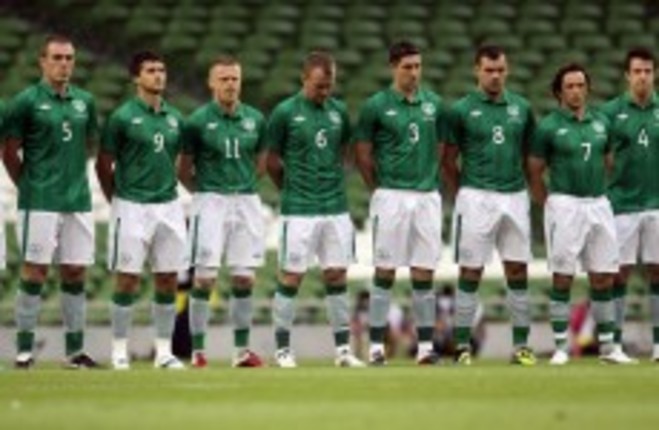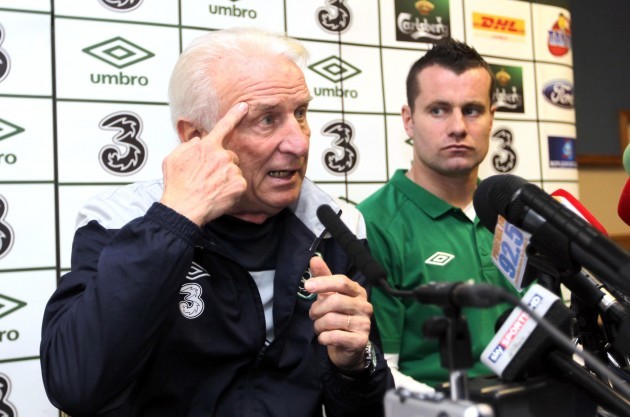TONIGHT’S GAME BETWEEN Ireland and Armenia will be the 475th time an Irish senior football team has taken to the field of play.
Our first international outing came way back to 1926 when the Italians easily beat us 3 – 0 in Turin.
Since then the team has travelled to faraway places like Brazil, Algeria and even Trinidad and Tobago and enjoyed unforgettable days and nights in cities such as Stuttgart, Rome, New York and Ibaraki.
Such great occasions have led to an insatiable demand for more among the Irish public, so much so that qualification to European and World Cup finals is now a must.
However, are our expectations in line with the reality? Is the Irish football team capable of this and should we really expect to qualify for these tournaments? Let’s take a closer look at the data.
Game of numbers
The recently published book “Why England Lose” provides evidence to suggest that England should qualify for about 66% of World Cups and European Championships.
From 1970 to 2008 this is exactly what happened; England reached six out of nine World Cups and six out of nine European Championships. Not great for a team that thinks it could win every tournament it qualifies for! As we all know, Ireland are not as prolific at qualifying for major tournaments.
From 1970 to 2008 we managed to qualify for just four. That’s only a 22% strike rate. Yet our expectations going into tonight’s game probably don’t match this. What should we expect? Should we actually qualify more than we do?
From 1926 to today the Irish team has a win percentage of 53% (this assumes a draw equals half a win as assumed by Kuper and Szymanski in “Why England Lose”). Examining the periods 1980 – 1995 and 1996 – 2011 we can see the Irish team did in fact get better.
Our winning percentage from 1980 to 1995 increased to nearly 58% while from 1996 to 2011 our win percentage increased to 60%! Our goal difference has improved too.
Between 1980 and 1995 we scored 1.43 goals for everyone conceded. This improves to 1.61 from 1996 – 2011. I know it’s impossible to score 1.61 of a goal but in reality it means that every second game we play we have a one-goal head start. That’s great news for Irish football.
But is it good enough? The inclusion of meaningless friendly matches against poorer opposition could be helping to increase our winning average.
Competitiveness
To overcome this, let’s consider just competitive World Cup and European Championship qualifiers, play-off games and finals matches. From 1926 to 2011 our win percentage was 54%.
This improves for the period 1980–1995 to nearly 59% and improves again to nearly 64% in last 15 years. Again, we are getting better in competitive competitions too!
More great news.
So why did this not translated itself into more great nights at Euro 2004 in Portugal or the World Cup 2010 in South Africa? The answer is simple.
Sadly, while our average win percentage is improving it is still not high enough.
Manager Giovanni Trapattoni and Shay Given this week in Malahide. INPHO/Donall Farmer
Direct qualification from the European qualifiers to the World Cup from 1998 to 2010 required a win percentage of more than 80% our around 25 points.
We’ve been way off the mark here. The play-offs, a more realistic route for us to take, required an average win percentage of nearly 69%. Again, we fall short. The only one of these competitions we reached was in 2002 when we managed a win percentage of 80% in our group (24 points from 30) and we still had to endure a play-off with Iran.
The European Championships are slightly easier to get to. From 2000 to 2008 direct qualification could be guaranteed, on average, with a win percentage of 76%, with a play-off assured for any team with an average win percentage of just 66% (two games out of three). Again, however, we are just falling short of the play-offs.
In fact, reaching the play-offs for World Cup and European Championship finals is a great example of current Irish squads over achieving!
Man in control
A final examination of the data from 1980 to 2011 is required to consider who might be best to keep bringing the squad forward. Over this 31-year period Ireland has had six full-time managers; four Irish men, Eoin Hand, Mick McCarthy, Brain Kerr and Steve Staunton and two foreign managers, Jack Charlton and Giovanni Trapattoni.
While some may oppose the idea of foreign management of the Irish team, Kuper and Szymanski have proved that outside managerial talent can be very beneficial to countries.
The same is true of Ireland.
Over the period 1980 to 2011 Irish managers have managed a win percentage of just under 60%. Charlton and Trapattoni have managed a win percentage of over 63%. Outside help certainly appears to make a difference. Our goal difference is better too. Foreign managers score 1.77 goals for every one conceded compared to the 1.72 ratio for Irish managers.
This might be a tiny difference. About one extra goal scored in every 30 games but it could be a goal in Windsor Park or The Giants Stadium. How important were they! The progress we are making is certainly positive.
If we can just find another five or six percentage we will be guaranteed play-off places at worst in every major qualifying tournament we enter.
Until we find this our expectations should stay grounded. We are moving in the right direction but not there just yet.
Robbie Butler, an Economics lecturer at University College Cork, has written extensively on soccer economics. Check out some that here.


